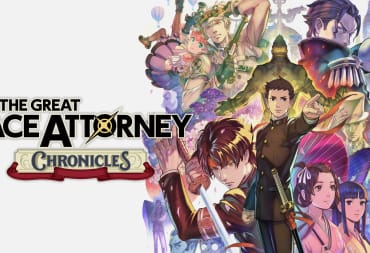Since the Japanese release of The Great Ace Attorney: Adventures back in 2015 on the 3DS and the arrival of its sequel The Great Ace Attorney 2: Resolve two years later, series fans have been eagerly anticipating a localized release. Over five long years have passed, and Western versions are finally here through The Great Ace Attorney Chronicles, which combines both games in a single streamlined package optimized for modern consoles. Whether you are a seasoned ace attorney yourself or a series newcomer, this latest entry quickly proved to be well worth the wait.
No Objections Here
If you haven’t played an Ace Attorney game before, they are ostensibly visual novels in which players take on the role of a defense lawyer fighting to prove their client’s innocence. Divided into distinct episodes with clear investigation and courtroom segments, the gameplay is a little more hands-on than you might expect from the genre. In investigations, players must navigate between examining crime scenes and speaking to potential witnesses in order to gain information to use as evidence in the subsequent trials.
Favoring spectacle over any semblance of realism, the courtroom in Ace Attorney games has always been more like a battlefield, where a prosecutor and defense lawyer engage in high-octane shouting matches as blood-pumping background music blares. Despite a drastic change of setting, from a bizarre interpretation of ‘modern-day California’ to a more grounded depiction of 19th century England and Japan, The Great Ace Attorney Chronicles follows some of this familiar structural formula with a number of refreshing gameplay additions and improvements.

The visuals, for one, are a noticeable step up from previous titles. Although not the first in the series to use 3D visuals rather than the earlier sprite-based art, animations are smoother and models are more detailed than ever. Much of the satisfaction of the protagonist Ryunosuke’s journey from rookie lawyer to courtroom king is in no small part due to the visual shift of his demeanor shift through the changes in his animations as the game progresses.
When the first case has Ryu defending himself against a murder charge in the highest court of imperial Japan, his desperate desk slams, stuttering voice and flittering nervous eyes in contrast to the smug grin of the arrogant prosecutor Auchi make him an immediately sympathetic character. Even outside of the courtroom, the design of each character you encounter is masterfully accomplished; expressive and brimming with personality to the extent that simply looking at the clothing and expressions of even the most minor of characters to try to suss out their true intentions was an incredibly rewarding endeavor.
.jpg?itok=eiO-5GoQ)
Supporting the excellent visuals is one of the best soundtracks in franchise history, with its grand orchestral melodies combining both period-appropriate Japanese and British elements to create some incredibly unique, not to mention memorable, sounds. Unfortunately, the voice acting is a little rougher than the score, with the performances for Ryunosuke, in particular, sounding a little stilted when put alongside the rest of the cast. Luckily, aside from a small handful of brief animated cutscenes, instances of fully-voiced lines are few and far between, making the presence of a couple of awkward lines a rare issue that is easy to ignore.
A Dance of Deduction
Much of the new gameplay comes from the addition of the great detective Herlock Sholmes and his assistant Iris Wilson, two enjoyable interpretations of Sherlock Holmes and Doctor Watson. Investigation sections are broken up by ‘Joint Reasoning’, in which players must work through deductions with Sholmes and correct his many, and often hilarious, mistakes. These segments are refreshingly hands-on, with beautiful music accompanying Sholmes and Ryonosuke’s elaborate dances across the screen. They also justify the use of 3D background environments in a way that previous entries could not, with players often being granted the ability to freely pan around scenes to highlight and examine objects. The result is a game that can convey enough complex information to tackle far more complicated cases than we have ever seen before, with murder plots that never become unfollowable despite how absurdly convoluted they may appear.

The biggest change in courtroom sections comes from the new addition of a jury, which is present for the majority of the cases set in England. Each of the six juror’s verdicts is represented by a literal giant set of scales set in the courtroom, with one side representing guilty and one innocence. On a handful of occasions, the jury is ready to present a guilty verdict and Ryu has to present a closing argument in an attempt to tip the balance. These involve hearing the reasons behind each juror's decisions and pointing out apparent contradictions and as each member of the jury has a unique personality, they present unique challenges each time. Whilst it might take compelling logic to persuade an upstanding city banker in one case, for example, trying to present the argument logic to a distracted elderly woman is unlikely to yield results.
The excellent multi-witness cross-examination mechanics first introduced in the Professor Layton vs. Phoenix Wright: Ace Attorney spinoff also make an appearance here, allowing you to keep an eye on other witnesses’ reactions to statements being made. If a statement doesn’t add up, another witness might let out an audio or visual cue suggesting confusion, prompting you to jump in.
The Adventures of Herlock Sholmes
Despite being more than disappointed by the quality of the writing in the last three mainline Ace Attorney games, The Great Ace Attorney Chronicles represents a fantastic return to form for the series. Every recurring character is complex and likable, and the presence of a large overarching plot comfortably maintained my interest throughout the game’s unprecedentedly long 65-hour runtime. Each case is filled with countless twists and turns, and unlike many of the more simplistic cases from previous games, the increased complexity of events kept me from ever working out the solutions too soon.
I did notice that The Great Ace Attorney: Adventures feels considerably more somber than its sequel, but the shift towards the absurd is gradual enough that it wasn’t too distracting. It is also worth noting that both games present a fairly frank portrayal of period racism, with many of the British characters, including the rival prosecutor, being immediately apprehensive of the Japanese protagonist Ryunosuke’s integrity. Things never felt like they went too far, but the theme is present enough that it will likely make some players uncomfortable.
It was also a little disappointing that so much of Resolve is dependent on the events of its predecessor. All cases bar one are in some way a sequel to a previous case, with one even taking place retroactively a day after events from a case in Adventures. Although I'm glad that all of the plot threads which were set up in the first game were neatly brought together, the reuse of a huge number of characters, animations, music and even sometimes entire locations, likely as the result of budget constraints, certainly makes the second half of The Great Ace Attorney Chronicles feel a little less original than that which came before it.
Still, for die-hard Sherlock Holmes fans, there are throughout a shockingly high number of, sometimes fairly obscure, callbacks and references to the original novels to enhance your experience. Many of the cases are heavily based on Conan Doyle’s novels and even a player with a casual knowledge of the books is sure to appreciate the subversions of the more well-known stories like The Hound of the Baskervilles and the roles of popular characters like Lestrade and Gregson.

Wearing these influences on its sleeve, the overall narrative is comfortably one of the most refreshingly different and most accomplished stories we've seen in the series so far. One or two cases are notable lower points, especially a few hours into the second game, but the overall quality is indicative of years' experience tweaking and refining the Ace Attorney formula. I would go so far as to describe The Great Ace Attorney: Adventures as a fundamentally perfect experience and, whilst Resolve isn't quite on the same level, the overall package is still an incredibly worthwhile time.
The Great Ace Attorney Chronicles Review - True to its Name
Building upon the strong foundations of the games that came before it, this standalone reimagining consistently surprised me with its seeming desire to innovate at every turn. Multi-witness testimonies, a heart-pounding orchestral score, and the introduction of a unique jury system make this new entry in the franchise far more than just a new coat of paint. If you only play one Ace Attorney game in your lifetime, make it this one.
A copy of The Great Ace Attorney Chronicles for PC was provided to TechRaptor by the publisher. The game is also available on PlayStation 4 and Nintendo Switch.
Review Summary
Pros
- A Gripping Narrative with Memorable Characters
- Gorgeous Visuals with Beautiful Animation
- Fantastic Orchestral Soundtrack
Cons
- Slightly Weaker Second Act
Have a tip, or want to point out something we missed? Leave a Comment or e-mail us at tips@techraptor.net








